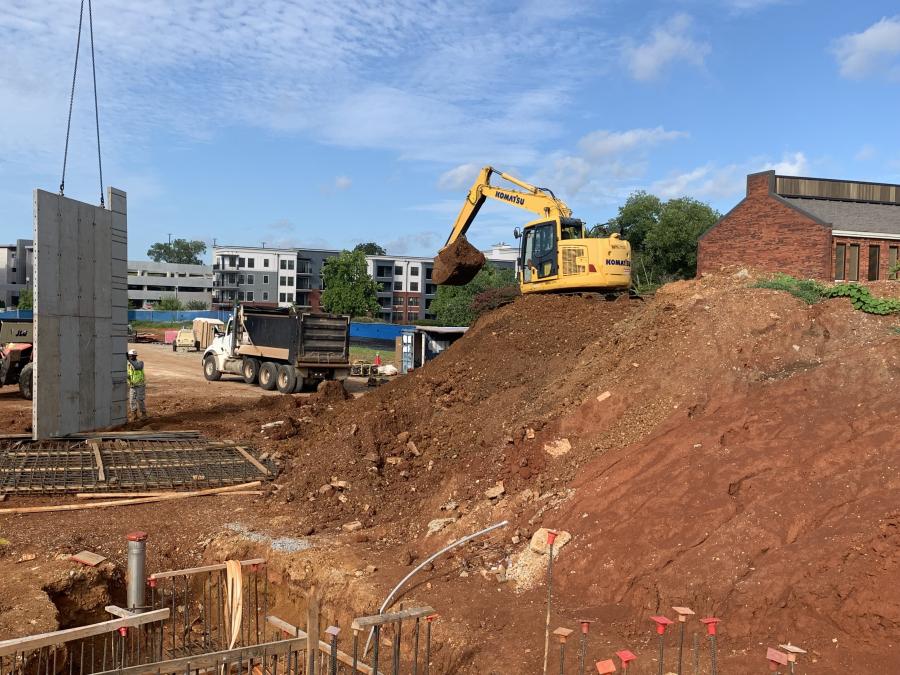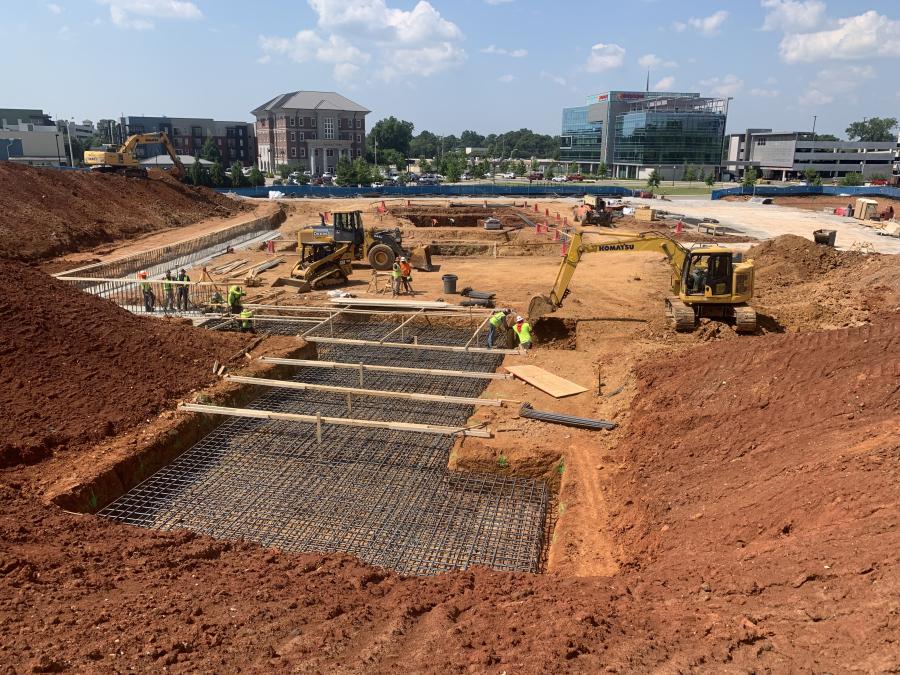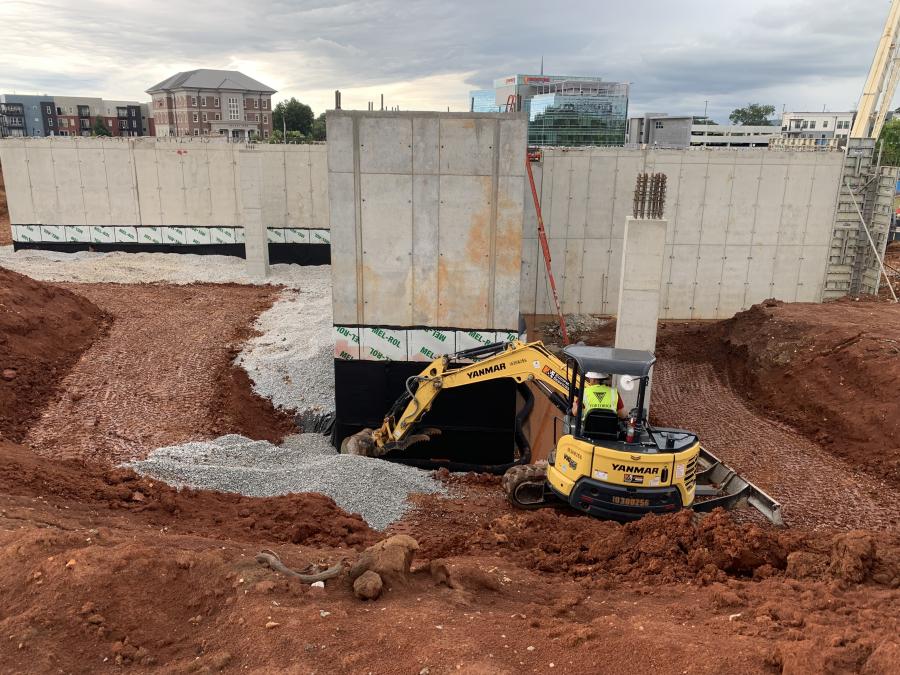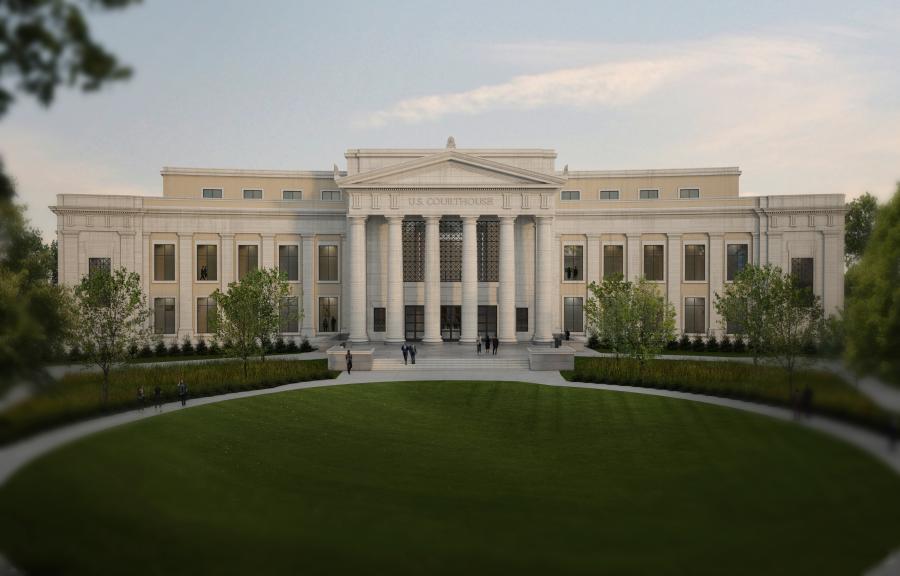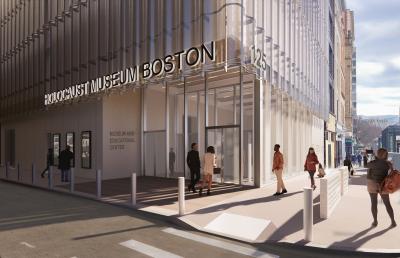With an eye to the future, officials in Huntsville are overseeing construction of a new $110 million federal courthouse that will house the U.S. District Court, Northern District of Alabama.
(Brasfield & Gorrie photo)
With an eye to the future, officials in Huntsville are overseeing construction of a new $110 million federal courthouse that will house the U.S. District Court, Northern District of Alabama.
When completed, the 123,100-gross-sq.-ft. building will be one of more than 8,000 federally owned and leased assets managed by the General Services Administration (GSA) and is considered long overdue.
"The current federal courthouse in Huntsville dates to 1937 and was originally constructed with only a single courtroom," said U.S. District Judge Liles Burke. "It has been modified over the years many times to accommodate additional judges and staff but is vastly inadequate for the needs of the court in 2022. Put simply, as the city of Huntsville and the Tennessee Valley has grown in population over the past century, the court facilities have not been able to keep up."
The highly anticipated building will include five courtrooms, with space for three U.S. district judges, one U.S. magistrate judge and U.S. bankruptcy judge. It also will house probation officers and staff, the clerk's office and the U.S. Marshals Service.
"It will be a great improvement to have a courthouse that has adequate room to conduct the duties of the court and serve the public," Burke said. "I am very happy with the architecture of the new United States Courthouse, which will be a very traditional neo-classical building. It will perfectly blend with the historic architecture that's so prevalent in downtown Huntsville, as well as complement the more modern architecture that's been constructed over the past 60 years."
A formal groundbreaking, led by the Honorable C. Lynwood Smith Jr., U.S. district judge of the Northern District of Alabama, was held in September. Outgoing U.S. Senator Richard Shelby, who's responsible for securing funding for the project, told the crowd the new structure will serve generations to come.
"It's about justice, it's about the rule of law, it's about addressing grievances and everything that goes with it," he said. "You are going to have something that's going to be here for a long time, and it's a heck of a location."
The project team includes design-build/contractor Brasfield & Gorrie LLC, bridging architect Payne Design Group LLC and architect of record SLAM Collaborative.
The new courthouse is being delivered via fast-track design build. The design-build contract was awarded in September 2021, with initial work taking place in April 2022.
"Currently, foundations and basement level cast-in-place concrete walls are nearing completion, and precast concrete structures that will house stairwells are being placed," said Aaron Rader, senior project manager of Brasfield & Gorrie. "Structural steel framing installation is about to begin, and the artist commissioned by the GSA as part of its art-in-architecture program is starting work for art that will be part of the project after completion."
The courthouse is being built on a brownfield site in Huntsville's city center. Multiple buildings previously occupied the property.
"Site work to date has consisted of excavation for the building basement," said Rader. "We've stockpiled excavated soil on site and will use it for the final backfill and grading."
Approximately 5,000 cu. yds. of dirt will be moved in total during construction. Rader added that the project is not without its share of challenges.
"A fast-track design-build project must always balance completion of the design and its impacts on any work included in early-work packages," Rader said. "This delivery method reduces risk to the owner, while minimizing impacts of inflation or other market factors by reducing the time from construction documents to actual construction. Minimizing market factors is especially important for this project, as bidding, design and the start of construction coincided with a period of record inflation.
"Add to this government requirements for the Buy American Act, certified payroll and the generally increased paperwork to meet government standards, making the selection of the correct trade contractors and vendors vital to the project's success."
Demolition of previous structures and an architectural study were performed prior to the property's transfer to the U.S. government in advance of the project, which has presented some unexpected issues.
"Our teams encountered a previously unknown underground storage tank while installing the sewer main," Rader said. "We've sequenced work to minimize schedule delay while removing the tank, per Alabama Department of Environmental Management regulations."
Rader added that workers have had to be prepared for unanticipated problems.
"One was an existing concrete structure located several feet below grade," he said. "The other was an underground fuel/oil tank. The project plan accounted for unforeseen conditions, so these issues have not adversely affected the project schedule.
"Supply chain disruptions, cement shortages and other factors in an industry that never slowed during the COVID-19 pandemic continue to pose opportunities for innovation and thoughtful strategies."
Regarding heavy equipment, the excavation for the building and main utilities and the backfilling of the site requires excavators, dozers, front-end loaders, articulated haulers, sheet foot rollers, dump trucks and skid steer loaders. As site finishing commence, the team will use motor graders, pavers and drum rollers.
"The project plan includes the use of a hydraulic rough-terrain crane to assist in erecting forms, installing resteel and other conveyance in the basement and installing precast tower sections," said Rader. "A temporary buck hoist will transport materials to the building floors, and an extending boom forklift is always on site for unloading and moving materials around the job site. We will soon mobilize a separate crawler crane to facilitate structural steel erection."
Rain has been a factor during foundation installation; however, to date the wet conditions have not exceeded the expectations within the construction schedule. In addition, the colder temperatures that are common this time of year require planning but are not expected to have an impact.
Time-consuming tasks include early planning and aligning program requirements to Congress-authorized funding. The team also must sequence structure and building envelope components to meet physical security requirements, including force protection and other Interagency Security Committee standards.
"Most federal courthouses include floor-to-structure drywall framing and walls to adhere to sound transmission requirements," said Rader. "Coupled with floor-to-floor heights that greatly exceed conventional commercial buildings, this requirement makes building information modeling anti-clash coordination and sequencing of the work imperative.
"Physical construction of the highly detailed and purposeful elements of the building also takes more time than conventional commercial building types."
Brian Murray, Brasfield & Gorrie vice president and division manager said, "This design and construction type is not for everyone and is certainly not a type of work to cut your teeth on. But with a team of highly knowledgeable experts in federal courthouse delivery, the exacting nature of this work is extremely rewarding.
"In addition to GSA's commitment to sustainability and delivering LEED-certified and soon to be net-zero projects, GSA employs two best practices that we encourage other owners and developers to consider. One is the use of industry peer review at 15 percent and 65 percent completion of construction. The Construction Excellence Peer Review program is managed by GSA's Office of Project Delivery. The process engages at least two construction peers to visit GSA's large capital projects to offer a ‘sniff check' on the health of the project. They also offer constructive advice to the project team based upon high-level observations."
Murray also emphasized the inclusion of a designers' and builders' registry.
"Everyone who works on the project has their name included on the registry, which is typically posted in a highly visible public space within the new facility. We encourage our project team leaders to share this best practice during pre-task and safety meetings so everyone working on the project can have a heightened sense of pride in their daily work efforts."
The new courthouse is expected to be completed by fall 2024. CEG
Cindy Riley
Birmingham, Ala., native Cindy RIley originally planned on a career in law, but during her sophomore year in college realized journalism was her true calling. A magna cum laude graduate of Samford University, Riley first worked in radio and TV. Named Best News Anchor, Best News Reporter and Best Investigative Reporter by the Associated Press, she interviewed numerous personalities, ranging from Dr. Henry Kissinger and President Bush to Michael Jordan and Captain Kangaroo.
As a print journalist, Riley has covered a variety of topics, including construction, business, health and the arts. In addition to CEG, her work has appeared in special reports for USA Today and the L.A. Times. Other publications have included New South Magazine, Portico, Thicket, Alabama Heritage, B-Metro, Business First and Birmingham Business Journal.
Read more from Cindy Riley here.
Today's top stories



